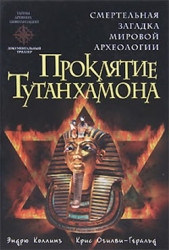Проклятие Тутанхамона

Проклятие Тутанхамона читать книгу онлайн
День 4 ноября 1922 года стал одним из величайших в истории мировой археологии. Именно тогда знаменитый египтолог Говард Картер и лорд Карнарвон, финансировавший раскопки, обнаружили гробницу фараона Тутанхамона, наполненную бесценными сокровищами Однако для членов экспедиции этот день стал началом кошмара. Люди, когда-либо спускавшиеся в усыпальницу, погибали один за другим. Газеты принялись публиковать невероятные материалы о древнем египетском демоне, мстящем археологам за осквернение гробницы…
В своей увлекательной книге известные исследователи исторических аномалий Коллинз и Огилви-Геральд подробно изложили хронологию открытия гробницы Тутанхамона и связанных с этим загадочных событий Основываясь на письмах и статьях знаменитых археологов, а также воспоминаниях очевидцев, авторы задаются сенсационным вопросом: не могли ли Говард Картер и лорд Карнарвон обнаружить в гробнице Тутанхамона некую взрывоопасную тайну, способную в случае огласки перевернуть сложившиеся взгляды на библейскую и мировую историю? И не могла ли эта тайна стать для первооткрывателей усыпальницы реальным проклятием — осуществляемым не мстительными богами Египта, а наемными убийцами на службе влиятельных политических сил, которым могла помешать неудобная правда?..
Andrew Collins, Chris Ogilvie-HeraldTUTANKHAMUN. THE EXODUS CONSPIRACY;TRUTH BEHIND ARCHAEOLOGY» S GREATEST MYSTERY Перевод с английского кандидата филологических наук С.В.Головой и А.М.ГоловаОформление обложки художника Евгения Савченко
Внимание! Книга может содержать контент только для совершеннолетних. Для несовершеннолетних чтение данного контента СТРОГО ЗАПРЕЩЕНО! Если в книге присутствует наличие пропаганды ЛГБТ и другого, запрещенного контента - просьба написать на почту [email protected] для удаления материала
7Ibid.
8Ibid.
9Ibid.
10Ibid.
11 Ibid.
12Ibid.
13Manetho, trans. Waddell, fr. 54,1. 237.
14Manetho, trans. Whiston, I, 26.
15Ibid., Osarsiph, or Osarseph in Manetho, trans. Waddell, fr. 54,1. 238.3.
16Manetho, trans. Whiston, I, 26.
17Ibid. I, 14.
18Manetho, trans. Waddell, fr. 54,1. 246.
19Manetho, trans. Whiston, I, 26.
20Ibid.
21Ibid. It is «grandfather Rapses» in Manetho, trans. Waddell, fr. 54,1. 245.
22Manetho, trans. Whiston, I, 27.
23Weigall, pp. 108-9.
24Ibid., p. 109.
25Ibid., p. 110.
26Ibid., p. 111.
27Ibid.
28Ibid., p. 112.
29Ibid.
30See Greenberg, The Hab/piru, and Na» aman, «Habiru and Hebrews: the transfer of a social term to the literary sphere», JNES 45: 4 (1986), pp. 271—88; Rowton, «Dimorphic structure and the problem of the «Apiru-«Ibrim», JNES 35:1 (1976), pp. 13–20.
31Weigall, pp. 115-6.
32See Meyer, Geschichte des Altertums, ii, pp. 421, 424-5, and Meyer, Aegyptische Chronologie, pp. 92—5.
33Budge, Tutankhamen, Amenism, Atenism and Egyptian Monotheism etc., p. xiii.
34Freud, Moses and Monotheism, pp. 97—8.
35Ibid., p, 42.
36Ex. 12: 12.
37Weigall,p. 111.
38Hecataeus of Abdera, quoted in Diodorus Siculus, Bib-liotheca Historica, 40, 1–8.
39Ibid., 40, 1.
40Ibid., 40, 3.
41Apion, Aegyptiaca, quoted in Josephus, II, 2.
42Redford, Akhenaten: the Heretic King p. 152.
43Weigall, p. 110.
44Budge, Gods of the Egyptians, I, p. 471; II, p. 361.
45Aldred, Akhenaten — King of Egypt, pp. 43, 260;
46Redford, pp. 146—7.
47Aldred, pp. 87, 273.
48Apion, in Josephus, II, 2.
ГЛАВА СЕМНАДЦАТАЯ. БОЖЬИ КАРЫ
1Manetho, Aegyptiaca, quoted in Josephus, «Flavius Josephus Against Apion», trans. Whiston, I, 26.
2Ibid.
3Ibid.
4Ibid.
5Redford, Pharaonic King-Lists, Annals and Day-books, 1986, p. 293.
6Assmann, Moses the Egyptian: The Memory of Egypt in Western Monotheism, p. 39.
7For an extensive discussion on the relationship between the Hyksos, the Thera eruption and the Tempest Stela see Chapter 16, Note 49- See also Redford, Egypt, Canaan, and Israel in Ancient Times, 1992, pp. 419—20.
8Aldred, Akhenaten: King of Egypt, pp. 173—4.
9Ibid., p. 174.
10Pendlebury, «Summary report on the excavations at Tell el-«Amarnah 1935–1936», JEA 22 (1936), p. 198.
11Ibid.
12See Pendlebury, pp. 197—8.
13Aldred, p. 174.
14Pendlebury, p. 198.
15Aldred, p. 180.
16See, for example, Reeves, Akhenaten; Egypt's False Prophet, pp. 75–78.
17Assmann, p. 26.
18See Pausanias, Description of Greece, 1,42.
19Aldred, p. 164.
20Mahdy, Tutankhamun: The Life and Death of a Boy King p. 175.
21Manetho, trans. Whiston, I, 26.
22Aldred, p. 164.
23Manetho, trans. Whiston, I, 26.
24Manetho, trans. Waddell, fr. 54,1. 232.
25Ibid., fr. 50, 1. 96, from Josephus, Contra Apionem, who gives the reign of Orus as 36 years 5 months; fr. 51, from Theophilus, Ad Autolyc. iii. 19, who gives 36 years 5 months; fr. 52, from Syncellus, according to Africanus, who gives 37 years; fr. 53 (a), from Syncellus, according to Eusebius, who gives 36 years (38 years in another copy); 53 (b) Armenian version of Eusebius, which gives 28 years.
26Ibid., fr. 50, 1. 96, from Josephus, Contra Apionem, who gives the reign ofAmenophisas 30 years 10 months; fr. 51, from Theophilus, Ad Autolyc. iii. 19, who gives 30 years 10 months; fr. 52, from Syncellus, according to Africanus, who gives 31 years; fr. 53 (a), from Syncellus, according to Eusebius, who gives 31 years; 53 (b) Armenian version of Eusebius, which gives 31 years.
27Ibid., fr. 50,1. 96, from Josephus, Contra Apionem, who gives the names of 18 kingsof the Eighteenth Dynasty; fr. 51, from Theophilus, Ad Autolyc. iii. 19, who gives 18 kings; fr. 52, from Syncellus, according to Africanus, who gives 16 kings; fr. 53 (a), from Syncellus, according to Eusebius, who gives 14 kings (but Syncellus elsewhere says he leaves out two kings); 53 (b) Armenian version of Eusebius, which gives 14 kings.
28Ibid., fr. 52, from Syncellus, according to Africanus; fr. 53 (a), from Syncellus, according to Eusebius; fr. 53 (b), Armenian version of Eusebius: «This is the king who was reputed to be Memnon, a speaking stone».
29Manetho, trans. Waddell, fr. 50,1. 96, from Josephus, Contra Apionem, who gives thereign of Acencheres as 12 years 1 month; fr. 51, from Theophilus, Ad Autolyc. iii. 19, who gives the reign of Acencheres as 12 years 1 month; fr. 52, from Syncellus, according to Africanus, who gives the reign of Acherres as 12 years; fr. 53 (a), fromSyncellus, according to Eusebius, who gives the reign of Achencherses as 12 years; 53 (b), Armenian version of Eusebius, which gives the reign of Achencheres as 16 years.
30Ibid., fr. 50, from Josephus, Contra Apionem; fr. 51, from Theophilus, Ad Autolyc. iii. 19.
31Ibid., fr. 50, from Josephus Contra Apionem; fr. 51, from Theophilus, Ad Autolyc. iii. 19.
32Ibid., fr. 52, from Syncellus, according to Africanus.
33Ibid., fr. 53 (a), from Syncellus, according to Eusebius; fr. 53 (b), Armenian version of Eusebius.
34Ibid., fr. 50,1. 96, from Josephus, Contra Apionem, who gives the reign of Ramessesas 1 year 4 months; fr. 51, from Theophilus, Ad Autolyc, iii. 19, who gives him 1 year 4 months; fr. 52, from Syncellus, according to Africanus, who gives him 1 year; fr. 53 (a), from Syncellus, according to Eusebius, who gives him 68 years; 53 (b), Armenian version of Eusebius, which gives him 68 years.
35Ibid., fr. 50, 1. 96, from Josephus, Contra Apionem, who gives the reign of Harmals as 4 years 1 month; fr. 51, from Theophilus, Ad Autolyc, iii. 19, who gives the reign of Harmais as 4 years 1 month; fr. 52, from Syncellus, according to Africanus, who gives the reign of Armesis as 5 years; fr. 53 (a), from Syncellus, according to Eusebius, who gives the reign of «Armais, also called Danaus» as 5 years; 53 (b), Armenian version of Eusebius, which gives the reign of Armais, also called Danaus» as 5 years.
36Ibid., fr. 53 (a), from Syncellus, according to Eusebius.
37Ibid., fr. 53 (b), Armenian version of Eusebius.
38Ibid., fr. 53 (a), Syncellus's additional note to Eusebius's text.
39See Manetho, trans. Waddell, fr. 52, from Africanus.
40For a full resume of these different Graeco-Egyptian and Graeco-Roman Exodus accounts, see Redford, 1986, pp. 282—96.
41See, for instance, Lysimachos, Aegyptiaca, from Josephus, Contra Apionem, trans. Waddell, I, 34.
42Ibid.
43Ibid.
44Ibid., I, 35.
45Cheremon, quoted in ibid., I, 33.
46Ibid.
47Pompeius Trogus, quoted in Assmann, p. 36.
48Bower, Scotichronicon, I, 9.
49 Ibid.

























